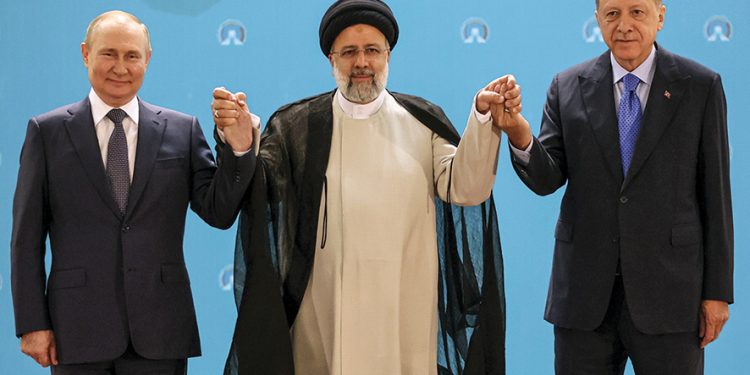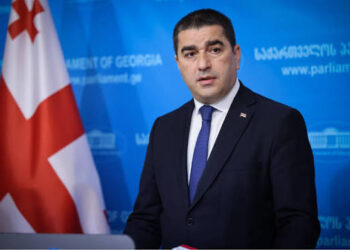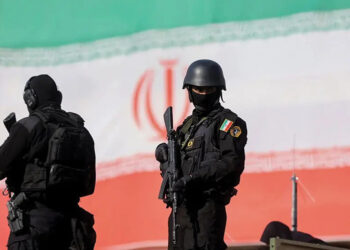Since the war in Ukraine began, Iran and Turkey have played a crucial diplomatic and economic role for Russia to withstand the Western pressure. Moscow believed that the alignment with Ankara and Tehran could further expand due to developing geopolitical circumsntances.
Tehran and Moscow developed close ties in the military realm, with Iranian drones and potentially ballistic missiles being sent to Russia to shore its war effort. Moreover, the two have also expanded their economic ties through implementing the long-stalled north-south corridor which effectively links Russia to the Global South as Moscow attempts to re-orient its trade from the West. In short, Iran and Russia have never been this close since the late 16th century, when both equally loathed the expanding Ottoman Empire.
Turkey has played a much nicer game, positioning itself as moderator between Ukraine and Russia, often hosting and facilitating various forms of negotiations between Moscow and Kyiv, whether through a grain deal or a prisoner swap. But Turkey also used Russia’s weaknesses and boosted its economy through tourism and in various industries. Trade between the two countries skyrocketed.
For Russia, Iran, and to a certain extent Turkey, were seen as actors which are much easier to cooperate with when it comes to Syria, the South Caucasus, the Caspian Sea and others. The understanding in Moscow was that this arrangement was of a long-term nature, and that the highly self-interested Iran and Turkey will only increase their cooperation with Russia.
This turned out to be a largely false belief. Recent weeks have showed that distrust between Russia and the two Middle East powers is very much alive, as are deep-seated disagreements. During the recent NATO summit in Vilnius, Turkey agreed to let Sweden into the alliance after months-long objections. Ankara also allowed the Azov fighters to return to Ukraine, leading the Kremlin to blame Ankara of violating a deal signed last year after the fall of Mariupol and imprisonment of Ukrainian fighters by Russian forces. The decision “goes against the terms of existing agreements,” the Russian president’s press secretary, Dmitry Peskov, said.
In another move, Ankara demanded that Russian peacekeeping forces leave the truncated Nagorno-Karabakh region in Azerbaijan in 2025, the date when its mandate officials ends. The venue – the Vilnius NATO summit – from which the Turkish president made this statement is telling. The long-running conflict in the South Caucasus is an arena where silent competition between Turkey and Russia has been unfolding.
With Iran, Moscow found itself in a difficult spot when, in July, Moscow and the Gulf Cooperation Council (GCC) states produced a statement which essentially questioned Iran’s claim over the three small islands (Greater Tunb, Lesser Tunb and Abu Musa) in the Gulf that are claimed by the United Arab Emirates (UAE), but which since the 1970s have been under Tehran’s direct control. Iran reacted harshily by summoning the Russian ambassador and accusing Moscow of undermining Iran’s territorial integrity. For Iran, it was a clear signal that Russia would prioritize others over the Islamic Republic.
Iran and Turkey, regarded as two pillars of Russia’s strategy to pressure the West, turn out to be not so firm after all. Both cases show the limits of Russia’s reliance on Turkey and Iran. It also shows cracks in the broader Eurasian push against the West.
This naturally does not mean that Moscow will not continue cooperating with Ankara and Tehran. The latter is especially in need of Russia as an instrument to withstand US pressure. Turkey, too, will carry on with its highly self-interested foreign policy. Its recent tilt toward the West is as much conditioned by Russia’s continuing war as Turkish internal political thinking. The difficult economic situation should be alleviated, and the West is a good source of investment. But once it is achieved, Turkey will revert back to its balancing between East and West.
Therefore, Russia’s Asia pivot has its limits. The cracks are there and they are real. Iran and Turkey now sense Russia’s weaknesses and try to advance their respective positions in the Middle East and the South Caucasus. Tensions will be unlikely to disspate any time soon, but the three powers will try to remain pragmatic. Economic, investment and regional geopolitical trends will push Moscow to stabilize ties with Ankara and Tehran.
Emil Avdaliani is a professor of international relations at European University in Tbilisi, Georgia, and a scholar of silk roads.
By Emil Avdaliani














